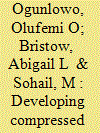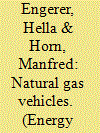|
|
|
Sort Order |
|
|
|
Items / Page
|
|
|
|
|
|
|
| Srl | Item |
| 1 |
ID:
137653


|
|
|
|
|
| Summary/Abstract |
The Nigerian government proposed the use of compressed natural gas (CNG) as an automotive fuel in 1997 as part of the initiatives to harness natural gas (NG) resources but progress has been slow. This paper examines the natural gas vehicle (NGV) implementation approaches and outcomes in seven countries with diverse experiences in order to gain an understanding of the barriers to the NGV market development in Nigeria. The analysis employs hermeneutic principles to secondary data derived from academic literature, published reports from a variety of international agencies, grey literature, and text from online sources and identifies eight success factors for NGV market development namely: strategic intent, legal backing, learning and adaptation, assignment of responsibilities, financial incentives, NG pricing, consumer confidence, and NG infrastructure. The paper concludes that the principal impediment to NGV market development in Nigeria is the uncoordinated implementation approach and that greater government involvement is required in setting strategic goals, developing the legal and regulatory frameworks, setting of clear standards for vehicles and refuelling stations as well as assigning responsibilities to specific agencies. Short-term low cost policy interventions identified include widening the existing NG and gasoline price gap and offering limited support for refuelling and retrofitting facilities.
|
|
|
|
|
|
|
|
|
|
|
|
|
|
|
|
| 2 |
ID:
179661


|
|
|
|
|
| Summary/Abstract |
This paper examines the relationship between economic factors and car-owners’ willingness to incur full costs of converting their cars to natural gas vehicles (NGVs) or to secure commercial loans to supplement their savings for meeting the attendant costs. The paper applies logit models on data generated from 429 randomly selected vehicle-owners, who had visited three big oil refuelling stations in Kinondoni district of Dar es Salaam city in Tanzania. The results show that the better the vehicle condition in terms of mileage, the newness or near-newness, the higher the number of car-cylinders, the more likely the car-owners would be willing to incur conversion-to-NGVs costs and use commercial loans to foot the bills. Private/family- and male-car-owners were more willing to incur these costs or use commercial loans to finance such conversion relative to taxi-car- or female-car-owners. Policy instruments such as the creation of awareness of the benefits of utilising NGVs, and provision of commercial loans emerged to be important in enticing car-owners to convert their cars to NGVs and incur the conversion costs. For quick response, the policy instruments should target newly bought cars which are in good condition and with bigger engine capacity, male- and private/family car-owners.
|
|
|
|
|
|
|
|
|
|
|
|
|
|
|
|
| 3 |
ID:
094279


|
|
|
|
|
| Publication |
2010.
|
| Summary/Abstract |
In Europe natural gas vehicles play a minor role. A decisive reason for this is the dependence of most European countries from gas imports. Except for Italy, there is no tradition to use natural gas as fuel. In addition, there is a lack of infrastructure (e.g. fuelling stations). In contrast to Europe, in Latin American and Asian countries natural gas vehicles are widespread. Some countries foster natural gas vehicles because they have own gas resources. Many countries must reduce the high air pollution in big cities. Environmental reasons are the main motive for the use of natural gas vehicles in Europe. In last years, high oil prices stimulated the use of natural gas as fuel. European governments have developed incentives (e.g. tax reductions) to foster natural gas vehicles. However, the focus is on hybrid technology and the electric car, which, however, need further technical improvement. In contrast, the use of natural gas in conventional engines is technically mature. Additional gas imports can be avoided by further improvements of energy efficiency and the use of renewable energy. In sum, the market penetration of natural gas as fuel should be promoted in Europe.
|
|
|
|
|
|
|
|
|
|
|
|
|
|
|
|
| 4 |
ID:
171489


|
|
|
|
|
| Summary/Abstract |
Natural gas vehicles (NGV) face significant adoption barriers in Jakarta. Therefore, a successful transition requires measures from the government. Owing to the high cost of transition policies, the efficacy of these policies must be analyzed to identify the most effective policy. The implementation of transition policies, however, could dynamically influence people's perception and behavior, which then changes the landscape of adoption barriers. Furthermore, even a seemingly successful policy may fail when a certain pathway of uncertainties emerges in the future. To address these concerns, we integrated agent-based modeling, exploratory modeling, and diffusion of innovation theory into the exploratory model-based diffusion analysis approach. This approach evaluates the policy's performance, explores changes in the relative importance of different adoption barriers, and identifies policy vulnerabilities, i.e., scenarios leading to policy failures. We tested this approach on four NGV transition policies targeting three adoption barriers. We found that the importance of adoption barriers and the critical uncertainties upon the implemented policies. The social–behavioral barrier predominates under current conditions, whereas the economic factor becomes more relevant when all policies are executed. Understanding the changes in adoption barriers and policy vulnerabilities will help decision-makers to prepare additional measures that ensure a successful transition.
|
|
|
|
|
|
|
|
|
|
|
|
|
|
|
|
| 5 |
ID:
137752


|
|
|
|
|
| Summary/Abstract |
Despite private investments exceeding two billion Euros and tax incentives of more than 500 million Euros, the market share of natural gas vehicles (NGVs) in Germany has lagged far behind expectations and behind market developments in other countries. With total cost of ownership being on average lower for NGVs than for gasoline and diesel vehicles this raises the question of the existence of market failure in the German NGV-market. We use a case study approach where we combine quantitative data with insights from a multi-industry expert panel and in-depth interviews with experts from industry, government and civil society in order to examine whether and how different types of market failure contribute to the status quo in the German market for NGVs. We conclude that coordination failure in complementary markets, an artificially created monopoly of service stations at motorways, imperfect information, bounded consumer rationality, and principle-agent-problems are the most prominent market failures inhibiting the development of a functioning market for NGVs. Our results are instructive for the design of effective public policies and investor strategies aiming to create markets for alternative fuel vehicles.
|
|
|
|
|
|
|
|
|
|
|
|
|
|
|
|
|
|
|
|
|